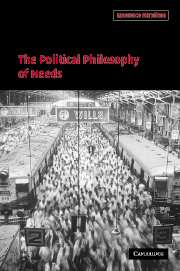3 - The political evaluation of needs
Published online by Cambridge University Press: 22 September 2009
Summary
The account of need formation in the previous chapter raised significant problems for a rational and discursive approach to the understanding and evaluation of needs in particular and politics in general. And it was argued that the theory of true interests as it stands is too naïve and could even be said to fall into the same traps as the more discursive analyses against which it is posited. In this chapter I conclude the argument and overcome this problem by attending to my two criticisms of Sen noted at the end of the last chapter in manifestly political or institutional tones. But first I dispose of a conceptual candidate for understanding these issues that relies on a similar kind of faith in practical reason and discursive deliberation to that found in Sen and the need theorists discussed in chapter 1: the concept of ‘civil society’.In the first section of this chapter I uncover what underpins the use of the concept, and why these assumptions make the concept inadequate for critical political theory, especially a needs-based critical account of the kind developed here.
In the remaining three sections of the chapter I develop an alternative conceptual framework for the political evaluation of needs and interests rooted in an account of practices, institutions and roles. I emphasise the causal significance of institutions, the epistemological significance of roles and the function of a coercive authority.
- Type
- Chapter
- Information
- The Political Philosophy of Needs , pp. 103 - 133Publisher: Cambridge University PressPrint publication year: 2003



